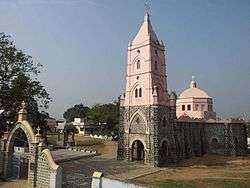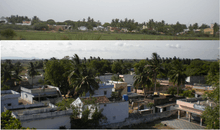Thurakapalem
| Thurakapalem తురకపాలెం | |
|---|---|
 | |
 Thurakapalem తురకపాలెం  Thurakapalem తురకపాలెం Location in Andhra Pradesh, India | |
| Coordinates: 16°19′50″N 80°3′53″E / 16.33056°N 80.06472°ECoordinates: 16°19′50″N 80°3′53″E / 16.33056°N 80.06472°E | |
| Country |
|
| State | Andhra Pradesh |
| District | Guntur |
| Taluka | Sattenapalli |
| Mandal | Muppalla |
| Government | |
| • Sarpanch | Sri M. Showraiah |
| • Village Revenue Officer | Sri |
| • Village Revenue Asst. | Sri |
| Population (2011) | |
| • Total | 1,400 |
| Languages | |
| • Official | Telugu |
| Time zone | IST (UTC+5:30) |
| PIN | 522 408 |
| Telephone code | 91 8641 |
| Vehicle registration | AP 07 |
| Literacy | 99% |
Thurakapalem is a village located in Muppalla Mandal of the Guntur district in the Indian state of Andhra Pradesh. This village comes under the authority of the Sattenapalli Assembly Constitution and the Narasaraopet Parliamentary Constitution.
History
Thurakapalem was founded around 1840. Many families left Gandikota to escape Muslim aggression in that region, and settled in the Guntur district.[1] These families, called Gandikota Kammas, originally practiced Hinduism, but converted to Roman Catholicism 50 years later with the arrival of British missionaries to the Guntur district around 1890.
Geography
Thurakapalem is located at 16°19′48″N 80°03′58″E / 16.330°N 80.066°E. It has an average elevation of 59 meters (302 ft) above sea level and is mainly situated on plains. It covers an area of approximately 800 acres and is located approximately 62 miles (100 km) to the west of the Bay of Bengal. It is considered very rich with fertile, arable land irrigated by canals.

The area has a hot, humid climate with extremely warm summers. The year may be divided into four climatic seasons: a dry and cool winter season (December to February), the summer season (March to May), the southwest monsoon season (June to September), and the post-monsoon, or retreating monsoon season (October to November). The temperature reaches 48 °C (118 °F) in the summer, falling to 18.6 °C (65.5 °F) in the winter. The yearly average temperature is 27 °C (81 °F).
Storms and depressions originating in the Bay of Bengal cross the district from the east. These cause widespread and very heavy rains and strong winds, mainly during the seasons of the southwest monsoon and the retreating monsoon. October is the wettest month of the year.
Demography
The population of Thurakapalem (as of the 2011 India census) is 1,400. The main religion practiced is Roman Catholicism, with Hindu communities living there also. Males and females each constitute approximately 50 per cent of the population. The village has an average literacy rate of 99 percent, with male literacy at 99 percent and female literacy at 96 percent. Ten percent of the population of Thurakapalem is under six years of age.
Culture
The spoken language of Thurakapalem is Telugu. Urdu is also spoken there. The traditional clothing consists of sari for women and pancha, lungi, or uttariya for men. Until 1940, Thurkapalem, as a part of the Guntur District, fell under the Catholic Diocese of Nellore. On February 23, 1940, Guntur split from the Diocese of Nellore and became a diocese in its own right, the Diocese of Guntur, led by its first bishop, Thomas Pothacamury.[2]
Cultivation
The inhabitants of Thurakapalem cultivate rice and commercial crops such as cotton, paddy, chilli, red grams, black grams, and subabul (Leucaena leucocephala) a popular forestry tree whose leaves can be used as cattle feed.[3]
References
- ↑ "Thurakapalem (Gandikota)". thurakapalem-gandikota.blogspot.co.uk. Retrieved 31 January 2015.
- ↑ "Diocese of Guntur". Amruthavani Communications Center. Glovus Technologies. Retrieved 15 June 2014.
- ↑ "Subabul". Tarahaat. Tarahaat. Retrieved 26 February 2015.
| Wikimedia Commons has media related to Thurakapalem. |